Research
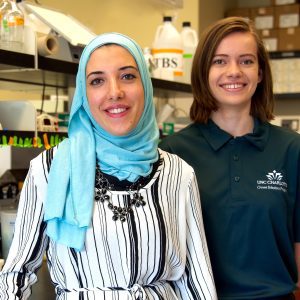
Outstanding CLAS Undergraduates Earn Goldwater Scholarships
Undergraduate students Mary (Tess) Overton and Nemah-Allah Saleh have received Goldwater Scholarships, as only the second and third students at the University ever to receive this award. The scholarship is the premier undergraduate award of its type in the fields of mathematics, the natural sciences and engineering.
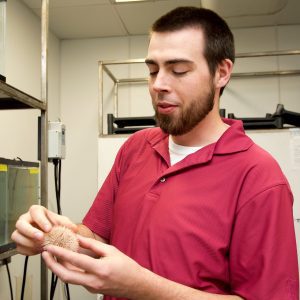
With NSF Fellowship, Student Researcher Explores Undersea World
Beneath the surface of the sea exists a vast world that UNC Charlotte student researcher Tyler Carrier seeks to explore through research at the intersection of evolutionary ecology, oceanography, and microbiology. “The questions I am attempting to answer are deeply rooted in fundamental evolutionary and ecological processes, and are also vastly unexplored,” Carrier says.
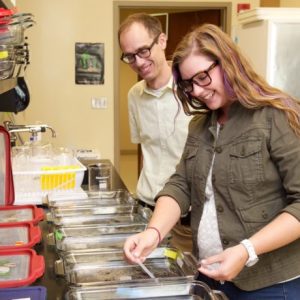
Biologist Studies Sea Anemones’ Response to Changing Environment
A sea anemone, with its columnar, jelly-like body and bouquet of tentacles that protrude from its head like a Medusa curlicue mass, looks every bit a weird sea creature. For UNC Charlotte’s Adam Reitzel, this curiosity of a marine invertebrate also holds fascinating clues on how changes in the environment may influence molecular mechanisms such as circadian clocks.

Graduate Students Win UNC Charlotte Three-Minute Thesis Contest
Squeezing years of work and thousands of words into a three-minute talk, graduate students Shayan Nazari and Danny Yonto earned first and second place in UNC Charlotte’s inaugural Three-Minute Thesis competition.
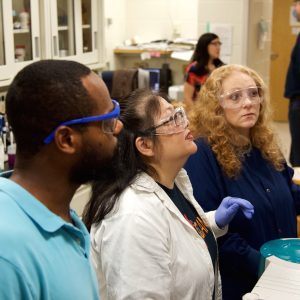
Research Reality: Teachers Study With Researchers in CTI Initiative
Teachers lay the foundation for students to understand and embrace science. This significant role holds true whether the students aspire to scientific careers or simply need as citizens to understand how scientific research can help their everyday lives. Despite their critical role, teachers often find themselves limited in their exposure to the settings where scientific research occurs. Charlotte Teachers Institute has worked to address that gap, including through a new research experience for teachers.
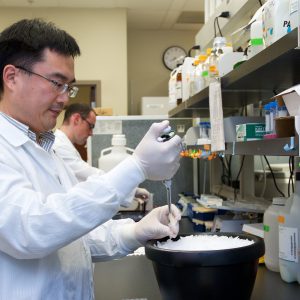
Study Characterizes Key Molecular Tool in DNA Repair Enzymes
New research by UNC Charlotte scholar Shan Yan and colleagues has revealed the function of a widely shared enzyme component, the Zf-GRF domain, as a critical molecular tool necessary for manipulating DNA during repair processes.
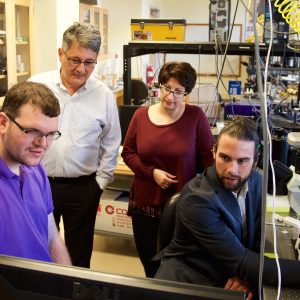
From Planets to Microspheres: New Optical Devices Target Real-World Problems
When Vasily Astratov explains complex principles of physics, specifically in the world of optics, he turns to St Paul’s Cathedral in London and its Whispering Gallery. Whisper on one side of the iconic dome, and someone standing a hundred feet away on the other side can hear the whispered words. The same principle is at work in optics, which has helped shape the groundbreaking work in Astratov’s lab in the Department of Physics and Optical Science at UNC Charlotte.

CMS Teachers Study With Researchers in CTI Initiative
Through a pilot program called the Summer Research Experience for Teachers, Charlotte-Mecklenburg Schools teachers collaborated with professors and graduate students in UNC Charlotte lab settings for the first time in summer 2016, to increase teachers’ access and exposure to the settings where scientific research occurs.

Researcher Uncovers Clues to Cancer, Neurodegenerative Disorders
Frogs and their tiny eggs are helping a UNC Charlotte researcher unlock the mysteries of genomic instability, with implications for cancer and neurodegenerative disorders such as Alzheimer’s and Parkinson’s Disease. Biological sciences assistant professor Shan Yan researches DNA damage that human cells sustain from thousands of internal and environmental assaults each day.

Math Meets Language and Cognition
English language learners in Mariella Duarte’s eighth-grade class at Whitewater Middle School in Charlotte face the steep task of learning middle school math in a language they have yet to master. For these students, the cognitive load can prove overwhelming. Anthony Fernandes, a mathematics professor at UNC Charlotte, is seeking solutions to that struggle.